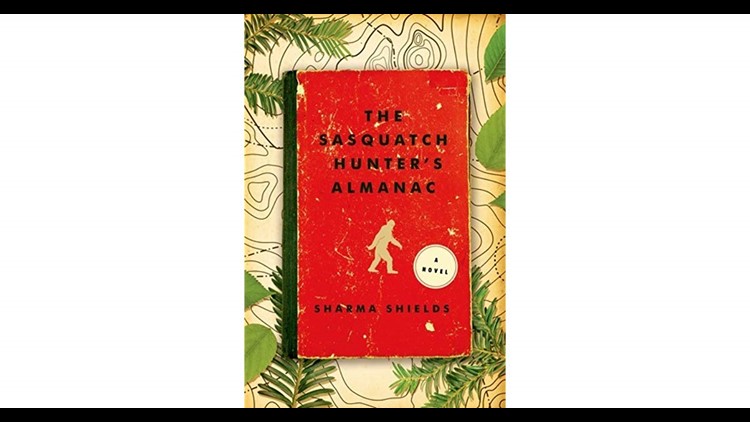KREM 2 has launched an online book club, featuring works by local authors and writers with ties to the Northwest.
The April 2019 book chosen by the KREM 2 Book Club is "The Sasquatch Hunter's Almanac" by Spokane author Sharma Shields.
The book is packed with symbolism. We had several questions for Shields following the end of this fascinating book. Below, she provides insight into he work.
Note: If you'd like to join the book club, visit the Facebook Page here.
KREM 2: The book is full of symbolism. What is the main message you want readers to take away at the end?
Sharma Shields: This book is really about family, about how we treat one another, and why our care with one another matters. Our choices directly influence those around us. At the end of the book, Eli must take responsibility for the ways he has hurt those he loves, and I hope it makes readers reflect on their own family relationships.
Motherhood and fatherhood were strong themes in this book. How did parenting (or lack of it) impact the characters’ lives? Would having competent parents improve their outcomes and kept them from interacting with the dark world?
In my experience, families carry the most loaded, painful, and complicated relationships. In the healthiest families, I believe people embrace responsibility, acceptance, and forgiveness. Parents in particular should show their children love and understanding, and it’s a major failure when they neglect to do so. As we see in the book, the ways parents behave have a direct impact on the children’s lives, and that impact can last a lifetime.
Agnes was in many ways a very unlikeable character – she not only left her son, but she seemed to feel very little guilt. In fact, she felt she did him a favor by leaving him when she couldn't really love him in the way he needed. How is it that a mom would feel no guilt? Or is that the point--that we as mothers take on guilt we shouldn't?
I just read an essay about using the word “unlikeable” for female characters as opposed to male characters, particularly when the book is written by a woman. The essay argues that women are not allowed the same sort of complexity and intricacy as their male counterparts. From my perspective, we really do put mothers in a particularly difficult role; if we, as moms, don’t choose to put our children first and foremost, we deserve to be hated/shunned. Meanwhile men neglect children or leave to start new families without any of the same criticism. Agnes makes a decision that is of course questionable to a lot of us with children (I have two kids myself), and she stands by it. She is capable of feeling confident of her choice while also being aware of its deleterious effects on a son she really did love despite her actions (and I believe she does harbor guilt and particularly longing, too, regarding Eli). She is a multifaceted character, both strong and vulnerable, wrong and right.
In your book does Sasquatch exist as a man -- or beast? Was Mr. Krantz really just a man who was living at an 'animal' state that we as humans fight daily to control?
The book suggests that Mr. Krantz is half-human (his father was a man), and I wanted him to be more human than beast. It’s worth saying that in some local Native legends, both Spokane and Colville, Sasquatch is seen as a man, even a brother, and not as a monster. I wanted people to be able to see something of themselves in the way Mr. Krantz must civilize himself to fit into the world around him. There’s something poignant even in a scene as wacky as the depilation appointment: He is changing himself physically to fit in, destroying a part of his unique wildness.
Why did Mr. Krantz want to come into the 'mainstream' world after a life in the wild?
I think this is debatable, but for me it has to do with the comforts of living in society, the demands of his new partner, and the impending birth of his son.
Why was Mr. Krantz so interested in meeting Eli, and then why did he try to save Eli?
The meeting between Mr. Krantz and Eli is an intense one, and is the first time Krantz recognizes Eli for who he is: Agnes’s son, the kind, attentive boy he met so long ago who Agnes abandoned her family. Mr. Krantz is capable of deep, human feeling, and he realizes why Eli hurt him so grievously in the woods. He is moved at the realization and forgives him, and then tries to help him, and this difficult cycle of pain and wrath and revenge is broken.
The characters who chose to interact with the mystical underworld seemed to see their lives fall apart after they did – Agnes with Mr. Krantz, Gladys with the hat, Amelia with the man and fish-creature in her car, Ginger with the palm reader in Spain. Is there a message that humans shouldn’t seek out other-worldly intervention? That we should be content with what we have already?
This is an interesting take on the book. It is true that these fates arrive as temptations for an easy-out, but there is no easy-out in life, we have to put in the effort ourselves and fight for what we love. In the case with Amelia, the old man on the lake is a warning that something is very amiss, that she has placed herself in grave danger with her boyfriend, and it’s a symbol of the discomfort of growing up and realizing you’ve made a terrible mistake. For me, the message of the book is not about being content with what we have, rather it’s about taking ownership for our actions, especially if they harm those we love. But the message somewhat changes depending on which character you’re discussing…These fantastical figures were in a way a version of the Three Fates (inspired by Greek mythology) we see at the end of the book; they are there to tinker with the lives of the characters and to force them to address their worst fears and behaviors.
Was the mystical underworld really there in the book or was it symbolic for what seemed to be a pervasive element of mental illness within the family?
This is also debatable. I like to keep reality and surreality ambiguous in my fiction, and for the reader to make their own call as to what is “real” or “imaginary.” For me, however, I would say, yes, the underworld in this particular bizarro world is very real to Eli, and not at all about mental illness, but rather about his need to take responsibility for his actions. He’s given a second chance.
Why did Eli choose to haunt Amelia?
I hope readers will see how Eli wronged Amelia in the novel, and realized how very much he had neglected her, abandoned her really, in a similar way to his own abandonment. At the very end of the book, he’s given a chance to make that right, and he takes it.
Was Amelia the real main character? You switched to first-person narrative for her. Was this her story all along?
Ah, I love this. Amelia was my favorite character in the book. While Eli’s story serves as the major arc tying the story together, I really did want the book to be as much if not more about the novel’s women. Amelia’s story was for me the most moving and beautiful. She had to survive both Gladys’s mental illness and her father’s neglect to grow into the woman she becomes, and she becomes hella strong in the process.
The book is full of magical realism, but it also feels very personal. Did your life influence the complex relationships in your novel?
Haha, yes, my personal life is all over this book, in more ways than I’d like to admit! I always love combining the fantastical with my own emotional reality; I believe those two poles heighten one another in interesting and metaphorical ways, and maybe they allow me to write more truthfully and fearlessly than I would in a straightforward memoir.
Do you believe in Sasquatch in real life?
I did a surprising amount of research for this book, and what I always tell people is that following the research, I went from being a Sasquatch atheist to a Sasquatch agnostic. Sasquatch predates the arrival of the colonists here, he’s been part of indigenous stories for hundreds of years. It’s great to remember he’s more than a pop culture reference or a figure on a beer label.




